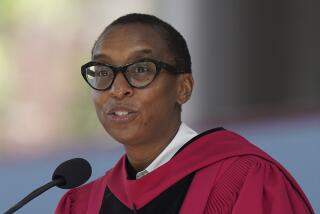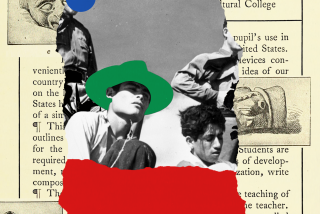Top Historian Becomes Tangled in Fictions
BOSTON — Everyone at Mount Holyoke College knew about professor Joseph J. Ellis’ service in Vietnam, said Angel Kozeli, a 2000 graduate of the small women’s college in western Massachusetts. In lectures in his foreign policy class and in his seminar on Vietnam and the American culture, Ellis vividly drew on his experiences in Southeast Asia, Kozeli recalled Monday.
For example, Ellis described how his Army unit cleared an area near My Lai shortly before the infamous massacre took place there, Kozeli said. With his impeccable reputation as a historian, “there was no reason to question any of it.”
But the scholar who just won the Pulitzer Prize for history now finds his personal history in doubt.
A story Monday in the Boston Globe reveals that Ellis never served in Vietnam. The front-page article further asserts the historian has greatly exaggerated his involvement in the civil rights and antiwar movements. The paper even questions whether, as he has claimed, Ellis was a high school football hero before attending the College of William and Mary and graduate school at Yale University.
Late Monday, Ellis issued a brief statement through his attorney, John Taylor Williams of Boston.
“Even in the best of lives, mistakes are made,” the statement began. “I deeply regret having let stand and later confirming the assumption that I went to Vietnam. For this and any other distortions about my personal life, I want to apologize to my family, friends, colleagues and students. Beyond that circle, however, I shall have no further comment.”
Defending the historian as “one of the most respected scholars, writers and teachers in the nation,” Mount Holyoke President Joanne V. Creighton said in a statement Monday that “we at the college do not understand what public interest the Globe is trying to serve through a story of this nature.”
But in an era where Vietnam revisionism rages and the war continues to gnaw at the national psyche, reporter Walter V. Robinson said the Globe had “no choice” but to print the article once it uncovered inconsistencies in the past of “one of the nation’s preeminent historians.”
Ellis, said Robinson, “is a historian known for his biography who has in the classroom told literally a generation of Mount Holyoke College students falsehoods about his own background as part of his courses on the Vietnam War. The alternative for us would be to withhold this information from the public, which is to allow the deception to go uncorrected.”
As one of the school’s most popular professors, Ellis is best known as an expert on early America. “American Sphinx,” his 1997 biography of Thomas Jefferson, won the National Book Award. He earned his Pulitzer in May for his best-selling “Founding Brothers: The Revolutionary Generation.” Ellis also wrote “The Passionate Sage,” about John Adams, and “After the Revolution.”
During a 1997 interview to publicize “American Sphinx,” Ellis told a Boston Globe interviewer that he was considering writing a book about his service in Vietnam. Last year, Globe reporter Mark Feeney followed up with another interview.
“It was very rare for an academic of his generation to have served in Vietnam. They were either protesting or getting deferments,” Feeney said. When Ellis told Feeney about his 1965 duty as a platoon leader and paratrooper in the 101st Airborne Division, “I thought, ‘Oh that’s interesting.’ But I had no reason to doubt what he said,” Feeney said.
Ellis also told Feeney he served on the Saigon staff of Gen. William C. Westmoreland, the American commander in Vietnam.
In fact, Robinson discovered, Ellis was in the ROTC at the College of William and Mary. He joined the Army in August 1969 and spent his three-year stint teaching history at West Point, holding the rank of captain upon his 1972 discharge.
As a historian, Ellis has been an advocate for his field, testifying in Congress as recently as last week to support an Adams memorial.
Ellis’ prominence made the apparent embellishments of his personal history all the more glaring. But while acknowledging that he could not think of a comparable situation, the vice president of Ellis’ publishing house said a personal embarrassment would not “bleed over” into the historian’s work as a scholar.
“There are many people who go through personal crises in their own lives,” said Paul Bogaards of Alfred A. Knopf in New York. In this case, he said, “I don’t think you will find anyone taking issue with Joe’s work as a scholar.”
But UC Berkeley professor Ben Bagdikian, himself a Pulitzer Prize winner in journalism, said Ellis’ behavior “raises credibility questions about how he deals with historical fact, even though it seems to have no connection to this [Pulitzer Prize-winning] book. I think that someone who fakes his personal history in a significant way does not deserve to be honored as a historian. I don’t think we should honor people who do that kind of fakery.”
Bagdikian added, “I would be very troubled if I were on the Pulitzer board.”
Seymour Topping, administrator of the Pulitzer awards, was traveling in Asia on Monday and was unavailable for comment.
The question of why this well-known professor would fabricate chapters in his life remained unresolved.
Perhaps, speculated Sissela Bok, author of a book called “Lying: Moral Choice in Public and Private Life,” this was a case of “self-deception,” where someone says something that is not true--but says it so often that to the person saying it, it becomes true.
“To some extent we all try to make sense of our lives. I can well understand a certain drifting when it comes to the facts,” said Bok, a fellow at the Harvard Center for Population and Development Studies.
Kozeli, Ellis’ former student, said she was still reeling from the news.
“What this means to me is that I have all of a sudden been confronted with someone I knew very well and was very proud of, who turns out to be a complete mystery. I hope something turns up to explain his claims.”






